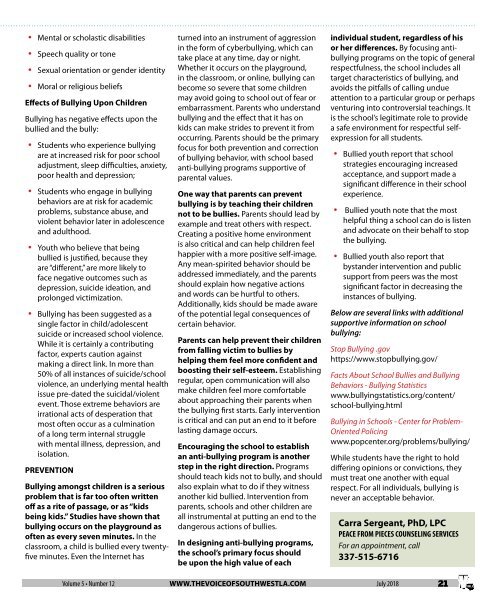The Voice of Southwest Louisiana July 2018 Issue
The Voice of Southwest Louisiana News Magazine July 2018
The Voice of Southwest Louisiana News Magazine July 2018
Create successful ePaper yourself
Turn your PDF publications into a flip-book with our unique Google optimized e-Paper software.
• Mental or scholastic disabilities<br />
• Speech quality or tone<br />
• Sexual orientation or gender identity<br />
• Moral or religious beliefs<br />
Effects <strong>of</strong> Bullying Upon Children<br />
Bullying has negative effects upon the<br />
bullied and the bully:<br />
• Students who experience bullying<br />
are at increased risk for poor school<br />
adjustment, sleep difficulties, anxiety,<br />
poor health and depression;<br />
• Students who engage in bullying<br />
behaviors are at risk for academic<br />
problems, substance abuse, and<br />
violent behavior later in adolescence<br />
and adulthood.<br />
• Youth who believe that being<br />
bullied is justified, because they<br />
are “different,” are more likely to<br />
face negative outcomes such as<br />
depression, suicide ideation, and<br />
prolonged victimization.<br />
• Bullying has been suggested as a<br />
single factor in child/adolescent<br />
suicide or increased school violence.<br />
While it is certainly a contributing<br />
factor, experts caution against<br />
making a direct link. In more than<br />
50% <strong>of</strong> all instances <strong>of</strong> suicide/school<br />
violence, an underlying mental health<br />
issue pre-dated the suicidal/violent<br />
event. Those extreme behaviors are<br />
irrational acts <strong>of</strong> desperation that<br />
most <strong>of</strong>ten occur as a culmination<br />
<strong>of</strong> a long term internal struggle<br />
with mental illness, depression, and<br />
isolation.<br />
PREVENTION<br />
Bullying amongst children is a serious<br />
problem that is far too <strong>of</strong>ten written<br />
<strong>of</strong>f as a rite <strong>of</strong> passage, or as “kids<br />
being kids.” Studies have shown that<br />
bullying occurs on the playground as<br />
<strong>of</strong>ten as every seven minutes. In the<br />
classroom, a child is bullied every twentyfive<br />
minutes. Even the Internet has<br />
turned into an instrument <strong>of</strong> aggression<br />
in the form <strong>of</strong> cyberbullying, which can<br />
take place at any time, day or night.<br />
Whether it occurs on the playground,<br />
in the classroom, or online, bullying can<br />
become so severe that some children<br />
may avoid going to school out <strong>of</strong> fear or<br />
embarrassment. Parents who understand<br />
bullying and the effect that it has on<br />
kids can make strides to prevent it from<br />
occurring. Parents should be the primary<br />
focus for both prevention and correction<br />
<strong>of</strong> bullying behavior, with school based<br />
anti-bullying programs supportive <strong>of</strong><br />
parental values.<br />
One way that parents can prevent<br />
bullying is by teaching their children<br />
not to be bullies. Parents should lead by<br />
example and treat others with respect.<br />
Creating a positive home environment<br />
is also critical and can help children feel<br />
happier with a more positive self-image.<br />
Any mean-spirited behavior should be<br />
addressed immediately, and the parents<br />
should explain how negative actions<br />
and words can be hurtful to others.<br />
Additionally, kids should be made aware<br />
<strong>of</strong> the potential legal consequences <strong>of</strong><br />
certain behavior.<br />
Parents can help prevent their children<br />
from falling victim to bullies by<br />
helping them feel more confident and<br />
boosting their self-esteem. Establishing<br />
regular, open communication will also<br />
make children feel more comfortable<br />
about approaching their parents when<br />
the bullying first starts. Early intervention<br />
is critical and can put an end to it before<br />
lasting damage occurs.<br />
Encouraging the school to establish<br />
an anti-bullying program is another<br />
step in the right direction. Programs<br />
should teach kids not to bully, and should<br />
also explain what to do if they witness<br />
another kid bullied. Intervention from<br />
parents, schools and other children are<br />
all instrumental at putting an end to the<br />
dangerous actions <strong>of</strong> bullies.<br />
In designing anti-bullying programs,<br />
the school’s primary focus should<br />
be upon the high value <strong>of</strong> each<br />
individual student, regardless <strong>of</strong> his<br />
or her differences. By focusing antibullying<br />
programs on the topic <strong>of</strong> general<br />
respectfulness, the school includes all<br />
target characteristics <strong>of</strong> bullying, and<br />
avoids the pitfalls <strong>of</strong> calling undue<br />
attention to a particular group or perhaps<br />
venturing into controversial teachings. It<br />
is the school’s legitimate role to provide<br />
a safe environment for respectful selfexpression<br />
for all students.<br />
• Bullied youth report that school<br />
strategies encouraging increased<br />
acceptance, and support made a<br />
significant difference in their school<br />
experience.<br />
• Bullied youth note that the most<br />
helpful thing a school can do is listen<br />
and advocate on their behalf to stop<br />
the bullying.<br />
• Bullied youth also report that<br />
bystander intervention and public<br />
support from peers was the most<br />
significant factor in decreasing the<br />
instances <strong>of</strong> bullying.<br />
Below are several links with additional<br />
supportive information on school<br />
bullying:<br />
Stop Bullying .gov<br />
https://www.stopbullying.gov/<br />
Facts About School Bullies and Bullying<br />
Behaviors - Bullying Statistics<br />
www.bullyingstatistics.org/content/<br />
school-bullying.html<br />
Bullying in Schools - Center for Problem-<br />
Oriented Policing<br />
www.popcenter.org/problems/bullying/<br />
While students have the right to hold<br />
differing opinions or convictions, they<br />
must treat one another with equal<br />
respect. For all individuals, bullying is<br />
never an acceptable behavior.<br />
Carra Sergeant, PhD, LPC<br />
PEACE FROM PIECES COUNSELING SERVICES<br />
For an appointment, call<br />
337-515-6716<br />
Volume 5 • Number 12 WWW.THEVOICEOFSOUTHWESTLA.COM <strong>July</strong> <strong>2018</strong> 21

















